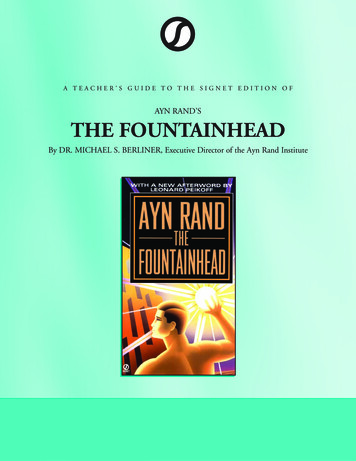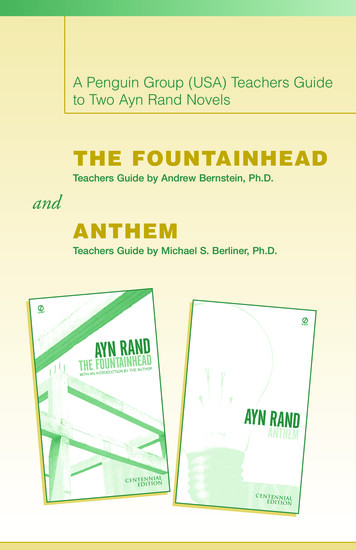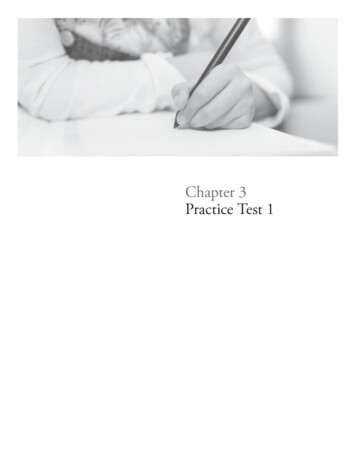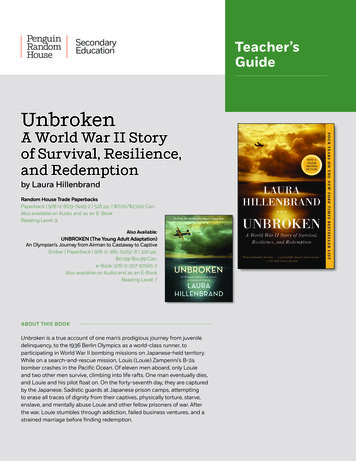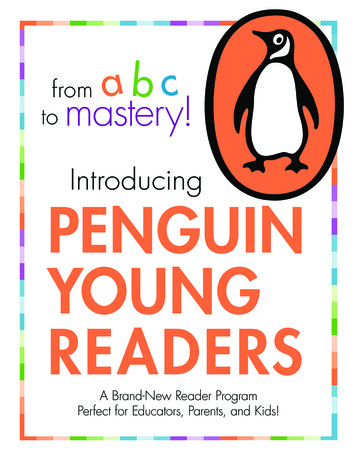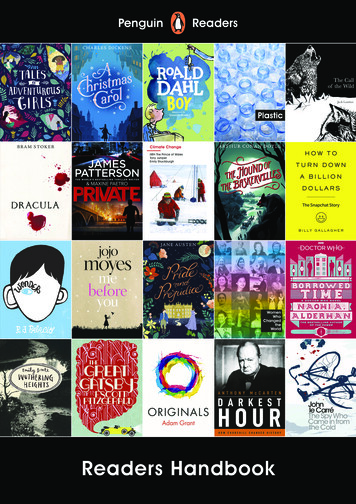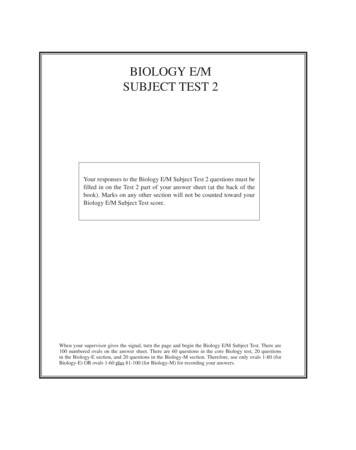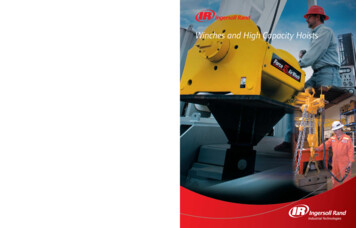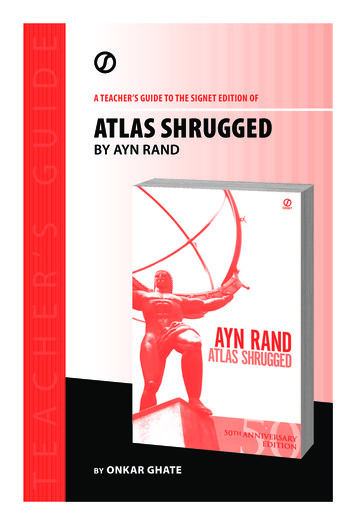
Transcription
G u I d ET E A c H E R’SRand Atlas TG 0816a.indd 1sA TEACHER’S GUIDE TO THE SIGNET EDITION OFATLAS SHRUGGEDBY AYN RANDBYonkar GhaTe08/16/1111:10 AM
2A Teacher’s Guide to the Signet Edition of Ayn Rand’s Atlas ShruggedTable of ContentsIntroduction.3THE MEN OF THE MIND ARE ON STRIKE.4ATLAS SHRUGGED IS A MYSTERY STORY. 11PLOT SUMMARY. 14PART ONE. 16PART TWO. 23PART THREE. 31Learning strategies to use before reading:suggested topics and assignments. 42Learning strategies to use DURING reading:suggested EXERCISES AND QUESTIONS. 44Learning strategies to use AFTER reading:suggested QUESTIONS AND TOPICS. 56Further Resources. 57ABOUT THE AUTHOR OF THIS GUIDE. 57ANNUAL ESSAY CONTESTS ON AYN RAND’S NOVELS. 59OF SPECIAL INTEREST TO TEACHERS. 60This teacher’s guide is being published in cooperation with:The Ayn Rand InstitutePO Box 57044Irvine, CA d.orgFor additional teacher’s manuals, catalogs, or descriptive brochures,please email academic@penguin.com or write to:PENGUIN GROUP (USA) INC.Academic Marketing Department375 Hudson StreetNew York, NY 10014-3657http://www.penguin.com/academicIn Canada, write to:PENGUIN BOOKS CANADA LTD.Academic Sales90 Eglinton Ave. East, Ste. 700Toronto, OntarioCanada M4P 2Y3Printed in the United States of AmericaRand Atlas TG 0816a.indd 208/16/1111:10 AM
A Teacher’s Guide to the Signet Edition of Ayn Rand’s Atlas Shrugged3IntroductionPublished more than 50 years ago,Atlas Shrugged, Ayn Rand’s last novel, is asrelevant and stimulating to an active-mindedperson today as on the day it was written. Thereason is not hard to identify. In AtlasShrugged Rand is concerned with timeless,fundamental issues of human existence.What is good? What is evil? Who deserves thetitle of hero and who the title of villain? Whatis the relation between the spiritual and thematerial sides of life, between soul and body?Should an individual prize the purity of hissoul and shun the material world of money,business and sex, should he do the opposite,or should he do neither? What virtues shoulda person practice? What sins should he avoid?What is the meaning of life? Are justice andhappiness possible in this world, or are man’shighest ideals forever beyond his (earthly)grasp? In what kind of society can an individual live and prosper, and in what kind ofsociety is he doomed to a different fate?“My attitude toward my writing,” Rand oncesaid, “is best expressed by a statement ofVictor Hugo: ‘If a writer wrote merely for histime, I would have to break my pen andthrow it away.’”1Dealing as it does with important issues, andoften presenting startling new takes on thoseissues, Atlas Shrugged is necessarily a long book.But although it is overflowing with new philosophical and moral ideas, it is anything but adry, difficult, abstract treatise. It is an excitingmystery story. The profound issues raised inthe story emerge from its specific events andthe concrete actions taken by the characters.The back cover of the paperback edition has itright: Atlas Shrugged is a novel both tremendous in its scope and breathtaking in its suspense. When teaching the novel, it’s helpful tonever lose sight of its mystery and suspense.No doubt many students will be intimidatedby Atlas Shrugged’s length. “You want me toread a 1,000-page-plus book!?” will often betheir initial reaction. To assuage these stu1 Introduction to the twenty-fifth anniversaryof The FountainheadRand Atlas TG 0816a.indd 3dents’ fears, it helps to emphasize that AtlasShrugged is a gripping suspense story, containing mysterious events and unusual butpurposeful characters who are faced with realand difficult problems. Tell such studentsthat once they get a few hundred pages intothe novel, they likely will be caught up in thestory’s mystery and find the book hard to putdown. (In fact, many teachers who teach thenovel report that one of their biggest problems is students who read ahead of theassigned chapters and give away the mysteriesto other students.) As a teaching strategy, it isuseful to ask students to write down themysterious events as they make their waythrough each chapter and then to speculateon the meaning and solution to each mysterybefore they read on to the next chapter. (I’llsay more on this below.)But of course Atlas Shrugged is not a typicalmystery story. To understand fully its suspenserequires thinking carefully about profoundissues. The theme of Atlas Shrugged, Rand said,is “the role of the mind in man’s existence—and, as corollary, the demonstration of a newmoral philosophy: the morality of rational selfinterest.”2 The widest meaning of the story, inother words, is that human life is sustained (tothe extent that it is sustained) by the thought,ideas, values and actions of thinkers and producers who attain an independent, rational,purposeful, this-worldly, reality-oriented frameof mind. A proper moral code should acknowledge and be based on this fundamental factabout human existence. (The Morality of Life,which the hero of the story, John Galt, formulates and teaches to his fellow strikers, is meantto be this code.) The conventional approach tomorality that now dominates in society, Randcontends in Atlas Shrugged, rejects and warsagainst this fundamental fact about humanlife. It is this clash of worldviews—this clash ofmoral and philosophical viewpoints—thatforms the context for Atlas Shrugged’s story andplot. Students will need their teacher’s help todraw out these wider ideas.2 For the New Intellectual08/16/1111:10 AM
4A Teacher’s Guide to the Signet Edition of Ayn Rand’s Atlas ShruggedHowever, this is best done not by lengthyphilosophical discussions disconnected fromthe actual story, but by emphasizing thecharacters and events: the things the characters say, the problems they struggle with, theactions they take, the values they hold, thestated and unstated motives that animatethem, the thinking they do or do not do inthe face of their predicaments. All of this isrichly delineated in Atlas Shrugged. Althoughit is a mystery story, it is not a murky story. Itis a novel about which one can ask “Why?” ofits events and characters and discover theanswer. Why does the plot progress in the wayit does? Why does this particular charactertake the action that he does? A careful readingof the story will usually supply the answer.Because Atlas Shrugged is a long novel with acomplex and abstract theme, there is an everpresent danger of either focusing on thespeeches and abstract theme of the novel atthe expense of the story, or of focusing on thestory’s events while losing sight of theirabstract meaning. Both are errors. The firsterror basically treats the novel as a propagandavehicle. On this approach, the events of thenovel are viewed as meaningless melodrama,designed to snare the unsuspecting reader sothat he sits through some abstract speeches.The teacher’s focus becomes almost exclusively on the speeches, as if those speecheswere nonfiction essays. This approach iscounterproductive. It at once robs the storyof its actual suspense and makes the speechesdifficult to understand. The story does notexist for the sake of the speeches: the speechesexist for the sake of the story. To appreciatethe speeches, one must see them as advancingthe action of the plot. And really to understandthe content of the speeches, one must seethem as encapsulating and explaining events,characters and motivations contained in thepreceding events of the story. Rip the speechesfrom this context, and they become very difficult for students to grasp. In other words,one must see the abstract meaning of thenovel, including of its speeches, as emergingfrom its specific events.The second error treats the novel as a mysterystory whose specific events have no deepermeaning or significance. At its worst, thiskind of approach views Atlas Shrugged as anovel about trains (I’ve literally heard thissaid). Better, but still flawed, is to view it as astory about the conflict between some goodbusinessmen and some evil bureaucrats whohave taken government controls too far,sprinkled throughout with some speechesabout money. There is no doubt, of course,that an aspect of Atlas Shrugged is about thenature and desirability of capitalism andeconomic freedom, but this is not its theme.Its theme is moral and metaphysical. Thenovel is concerned with the question “Inhuman life, what fundamentally is good andwhat is evil?” (its moral dimension) and withthe question “What fact or facts of realityground the distinction between good and eviland therefore form the base of a proper moralcode?” (its metaphysical dimension). All theparticular actions and conflicts of the storyrevolve around these basic issues.The best way to retain focus on both the storyand its timeless, abstract meaning is to neverforget the fact that Atlas Shrugged is a novelabout a strike. Let me now turn to this topic.The Men of the Mind Are on StrikeA good novel often has a basic line of actionthat integrates its story into a whole. For AtlasShrugged, this action is a strike. The theme ofAtlas Shrugged, we noted, is the role of themind in man’s existence. Connecting a novel’stheme to its plot is what Rand called a plottheme, which she describes as “the centralconflict or ‘situation’ of a story—a conflict interms of action, corresponding to the themeand complex enough to create a purposefulprogression of events [i.e., to create a plot].”What is the plot-theme of Atlas Shrugged?“The men of the mind going on strike againstan altruistic-collectivist society.”33 “Basic Principles of Literature” in The Romantic ManifestoRand Atlas TG 0816a.indd 408/16/1111:10 AM
A Teacher’s Guide to the Signet Edition of Ayn Rand’s Atlas Shrugged5The plot-theme of a strike by men of greatintelligence, ability and achievement servesto convey Rand’s distinct theme. She highlights her view of the role of the mind inman’s existence by showcasing what happenswhen the mind is deliberately withdrawn: lifeand civilization collapse. The meaning ofAtlas Shrugged is that the logical, reasoningmind is the creator of all the values of bodyand of spirit that advance an individualhuman life and civilization itself.art (e.g., Richard Halley), and so on. They arethe fictional counterparts of individuals suchas Socrates and Aristotle, Galileo andDarwin, Carnegie and Rockefeller, Beethovenand Hugo. But despite their life-givingrole—both as exemplars of what it means topursue the goals one’s own life and happinessrequire and as teachers of what goals oneshould pursue and of how to achieve them—the men of the mind are granted no moral ormetaphysical recognition.The fact that Atlas Shrugged is a novel about astrike dictates the types of characters thestory contains. First and foremost, there arethe strikers, the earliest of whom are Francisco d’Anconia and Ragnar Danneskjöld,led by the novel’s hero, John Galt. Second,there are individuals that the strikers aretrying to persuade to join their cause, such asEllis Wyatt, Hank Rearden and Dagny Taggart. Either these individuals eventually jointhe cause, with Dagny being the last to do so,or, as in the case of Dr. Robert Stadler, theymake terms with the strikers’ antagonists.Third, there are the intellectual, cultural andpolitical leaders of society, people such as Dr.Simon Pritchett, Dr. Floyd Ferris, BalphEubank, James Taggart, Wesley Mouch andMr. Thompson, who are the strikers’ antagonists. Last, there are the rest of the membersof society, who are not drivers of the action orthe conflicts but who have an enormous stakein the outcome of the strike and who must(eventually) choose sides. Their most individualized representatives in the story aresuch people as Eddie Willers, Cherryl Brooks,and the members of Hank’s family.What does this mean? It means that mankind’s leading doctrines declare that the menof the mind are evil or useless. Morally, themen of the mind are denounced as selfish,uncompromising, materialistic, exploitive,immoral men, who place the head above theheart and flout their unquestionable duty toserve others. Metaphysically, it is said thatcertainty is impossible to man, rationalthought is a myth (“Why Do You Think YouThink?”), new ideas flow out of the “forces ofproduction” and amorphous social interaction, and physical labor is the source ofwealth.If Atlas Shrugged is a novel about a strike, thebasic question is who is on strike and why?On strike are the men of the mind, the individuals who discover and teach the rest of themembers of society what to value and how tocreate it. They are the pioneers in every field,the individuals who discover new philosophical ideas and scientific theories (e.g., Galt),invent new lines of business and forms ofproduct
ATLAS SHRUGGED BY AYN RAND BY onkar GhaTe T E A c H E R ’ S G u I d E A TEACHER’S GUIDE TO THE SIGNET EDITION OF s Rand Atlas TG 0816a.indd 1 08/16/11 11:10 AM. 2 A Teacher’s Guide to the Signet Edition of Ayn Rand’s Atlas Shrugged This teacher’s guide is being published in cooperation with: The Ayn Rand Institute PO Box 57044 Irvine, CA 92619-7044 1-800-365-6522 File Size: 1MBPage Count: 60
